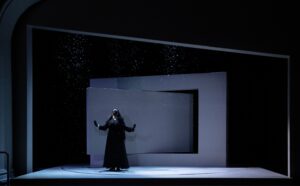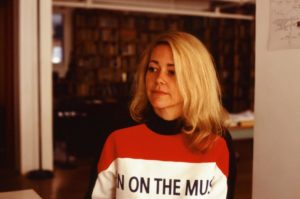
Prototype Festival 2024 Review: Adoration
Mary Kouyoumdijian & Royce Vavrek’s Opera World Premiere is Shockingly Timely
By Jennifer PyronPhoto: Maria Baranova
Prototype Festival presented “Adoration” at New York City’s The Sheen Center for Thought & Culture on January 12th, 2024. It was an innovative opera, featuring both voices, an amplified string quartet, and technical sound engineering, composed by Mary Kouyoumdjian with a libretto by Royce Vavrek. This world premiere, shockingly timely, challenged audience members to examine bias while diving head-first into the complex compositions of Kouyoumdijian with total abandon.
Based on the eponymous 2008 film by Atom Egoyan, “Adoration,” explores the fictional story of a young boy, Simon, grasping to understand his own reality. As an orphan, Simon is raised by his grandfather to believe his Palestinian father killed his white mother in a car accident when he was a young boy. As a teenager, Simon’s curiosity fuels his imagination when he is prompted to translate an article from French to English for his teacher. While doing this exercise, he begins to experience fragmented memories, stories, and suspicions of his grandfather’s bias against his father. This vacillation leads him down a path of self-abandonment, ultimately discovering more about the complexities of the human experience.
Performance Spotlights
The opening scene featured young Simon, played by Sammy Ivany, laying on the floor of the stage quietly dreaming and building a paper airplane by himself. The stage prop behind him was a slightly angled white wall. A larger frame, looking like an external fragment of the same prop wall, was fixed around the edge of the stage, making the vision of this young boy feel contained and memorialized: the audience was the outsider looking in. But this impression did not last for long.
Sammy Ivany’s portrayal of young Simon throughout this production was that of an innocent and pure being. His presence was a guidepost to remind one of the goodness of humanity and the open mindedness of youthful beginnings. Oftentimes, young Simon travelled with the audience between the alternate realities of this production, making it easier to follow where it was all going. He observed the turmoil around him, but in his naïveté was made whole and never reduced. Although he never had a singing or speaking part, his impact was greatly felt.
Seventeen-year-old Simon, performed by tenor Omar Najmi, was the main character, and had many opportunities to interpret Kouyoumdijian’s score with his voice. In OperaWire’s 2023 review of Najmi’s performance in Fresh Squeezed Opera’s “The Artwork of the Future,” the tenor was described as having a “clear voice with impeccable diction.” While this remained the case during this production, there were moments when Najmi was interacting with video equipment on stage that took the audience away from being able to enjoy his unadulterated voice. The technology-driven effects used in the production were meant to evoke distorted and jarring moments. However, due to this, Najmi’s voice never felt like it was given the space to fully unfurl. Maybe this was all planned, and part of the intentionally unsettling elements found throughout “Adoration.” Regardless, Najmi did a brilliant job with everything he was expected to manage during this production. His voice carried a gravitas that spoke volumes about the wisdom one could clearly see behind his eyes.
Soprano Miriam Khalil as Simon’s high school teacher, Sabine, was incredible. Her voice poured out into the audience without ever holding back. Kouyoumdijian’s score allowed Khalil’s voice to transform over the course of the opera, exceeding one’s expectations for what a contemporary/amplified opera can do for a pure lyric coloratura. It was extremely captivating to experience Kouyoumdijian’s unique soundscape with Khalil’s voice. At times, the sonic atmosphere almost swallowed her fragility, and at other times it became a vast, infinite space where Khalil’s voice was the only point of focus in the night. From a singer’s honest perspective, this was superb writing and understanding on Kouyoumdijian’s part, and an unusual gift to behold. Khalil was mesmerizing from the moment she came on stage. She centered the production around the drama unfolding, present as a witness to it but not a distraction. It seemed that while her role was essentially to stir a very large pot, Khalil’s purposeful and grounded presence had a greater impact than the whole story surrounding her. She sang with a conviction and guttural power that cannot be taught, but only lived. It is not often that one gets to experience the raw and undisturbed force of one’s voice in the way that Khalil explored with Sabine. The palpable, otherworldly connection between Kouyoumdijian’s score and Khalil’s voice deserves to be expanded and further explored in the future. Brava!
More Cast Highlights
Baritone David Adam Moore as Simon’s uncle, Tom, navigated a challenging role with great profundity. His vocal dynamics and technique illuminated his role as something significant, and made this production’s most dramatic moments believable. The combination of his acting and singing were products of his own personal degree of self-awareness. He took action only when it was appropriate for his role. He made it clear that there was a greater depth to Tom than what we saw, and never for a minute did we believe that his character’s markedly biased beliefs were the only things that defined him. Moore brought to the fore all that makes being a human challenging, disturbing, and ever-changing. His voice carried the weight of someone processing the entirety of human existence, but never faltered in remaining steadfast to his vocal training. It was very refreshing to witness this indeed.
The roles of Simon’s grandfather, Morris, and the principal of Simon’s high school, were both performed by bass-baritone Marc Kudisch. In both roles, Kudisch exemplified the hardened persona of someone battling an even tougher callousness towards life. Kudisch’s voice was hair-raising with intensity as he hurled hatred across the stage. Even as a frail, older version of Simon’s grandfather, Kudisch burned with an insatiable distaste for resolve and resolution. It was difficult to feel and listen to what he represented, but it must be noted that Kouyoumdijian’s sonic atmosphere of growling bass-scapes and stomach churning spatial dissonance made Kudisch’s emotions part of the audience’s experience. It was as if the hate were contagious, seething and desiring to consume everyone in its path. One could not deny an ever-present, lingering sensation of uneasiness that lurked in the background of this opera at all times. Kudisch was another very notable highlight of this production, and the embodiment of the story’s powerful and ever-present phantom.
Mezzo-soprano Naomi Louisa O’Connell as Simon’s mother, Rachel, was a beautiful and ethereal example of librettist Vavrek’s design. It was impressive to see how both Simon’s mother and father were brought into the script of the opera. Vavrek made this as intentional as possible, articulating and justifying their existence in a story that takes place after their deaths, and their presence made the narrative clear and satisfying. Even if someone went into this opera without knowing anything about Egoyan’s original story, they would be able to clearly follow and understand the storyline based on the libretto. In fact, Simon’s father, Sami, played by tenor Karim Sulayman, depended on this narrative clarity to make his role most impactful. Sulayman’s voice was warm and resonant. His acting was natural and complimentary to O’Connell’s. Both navigated an intricate synopsis with grace and ease, making it an enjoyable experience.
Stage Direction and Details
Director Laine Rettmer pieced this drama together with aplomb. Their instinct was felt throughout the entire production, making it more about the human experience than the “stage.” There was no veil to hide what Egoyan desperately wanted this story to convey: it was a message to be understood by anyone, anywhere. It was so special to see this production’s world-premiere. Rettmer’s work is making a huge difference in the world of performance art right now.
Set designer Afsoon Pajoufar and lighting designer Scott Bolman did excellent work, inviting the audience to zoom in, examining the story as if under a microscope, to predict where the story was headed through carefully-laid details and clues. The stage, designed to rotate and churn like the inside of a young mind, was fascinating. The moment when Sabine stands with arms raised in the middle of fresh falling snow was breathtaking. The Sheen Center for Thought & Culture was a great space to see this production’s beginnings, but one might wonder what it would be like in a larger and more open environment. All this is to say, there were moments when it felt like this production would benefit from more physical space to indulge in itself. Projection designer Camilla Tassi, cinematographer April Goldberg, and video engineer Joey Moro put in a lot of effort to make the critical details of this story digestible with video. Costume designer Rachel Dainer-Best’s decision to make Simon’s mother’s dress red was a beautiful piece of foreshadowing. Music director Alan Pierson and musicians including Gillian Gallagher (viola), Nicole Sharlow (violin II), Courtney Orlando (violin I), and Maria Bella Jeffers (cello), did a remarkable job filling the hall with music that brought Mary Kouyoumdijian and Royce Vavrek’s timely and impactful “Adoration” to life.



